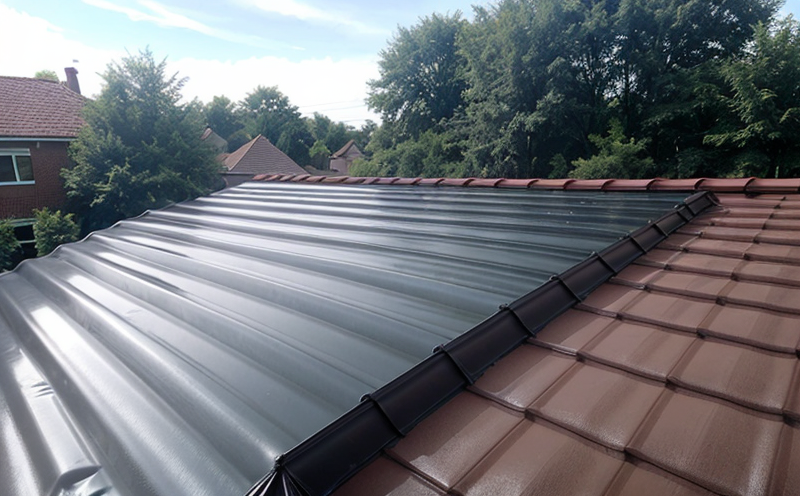EN 1928 Bituminous Membrane Waterproofing Testing
The CEN-approved standard EN 1928 specifies the procedures for determining the water resistance properties of bituminous membranes used in roofing and waterproofing applications. This service is crucial for ensuring that roof systems are capable of withstanding weather conditions, thus protecting buildings from structural damage due to moisture intrusion.
Bituminous membranes play a critical role in the construction industry by providing a barrier against water seepage. EN 1928 testing ensures these membranes meet stringent performance criteria, thereby enhancing safety and durability of roofing systems across various climates and environments. Compliance with this standard is mandatory for manufacturers aiming to sell their products within the European Union and other regions that adopt CEN standards.
The testing procedure outlined in EN 1928 involves subjecting specimens to a defined water pressure gradient over time, simulating real-world conditions of rainwater penetration. The apparatus used includes a specially designed tank filled with deionized water at a specified temperature. Specimens are positioned vertically within this tank according to predefined guidelines.
The testing process begins by preparing the bituminous membrane specimens according to EN 1928 specifications. Once prepared, these samples undergo immersion in water under controlled conditions for up to 7 days. During this period, continuous monitoring is conducted using precision gauges to measure any leakage through the membranes. At intervals, observations are recorded to document any changes observed.
After completion of the immersion phase, specimens are carefully removed from the testing apparatus and inspected visually for signs of water penetration or damage. If required, further destructive testing may be performed to assess the structural integrity of the membrane. Reporting involves detailed documentation of all observations made during both the immersion period and subsequent inspection.
Compliance with EN 1928 not only ensures product quality but also supports sustainable building practices by promoting longevity and reducing maintenance costs associated with premature failure of roofing systems. Additionally, it fosters confidence among stakeholders regarding the reliability of materials used in construction projects.
For those involved in quality assurance, compliance management, or research & development within the building sector, understanding EN 1928 is essential for effective implementation and monitoring of waterproofing solutions. Knowledge of this standard allows professionals to select appropriate testing methodologies that align with international best practices.
Why It Matters
Waterproofing membranes are integral components of roofing systems designed to safeguard buildings against water ingress, which can lead to significant structural damage if left unchecked. Properly executed EN 1928 testing ensures that bituminous membranes perform optimally under expected environmental stresses, thereby enhancing the overall safety and durability of structures.
From a business perspective, adherence to such standards is vital for maintaining brand reputation and ensuring market competitiveness. Companies that comply with international standards like EN 1928 are more likely to secure contracts from clients who prioritize sustainability and long-term performance in construction projects.
In terms of regulatory compliance, meeting the requirements set forth by EN 1928 helps avoid legal issues related to non-conformity, ensuring smooth operations throughout the supply chain. Furthermore, this standard supports continuous improvement efforts aimed at developing innovative waterproofing solutions that meet evolving market demands while adhering to strict quality control measures.
The importance of EN 1928 cannot be overstated for its role in safeguarding both property and people's health by minimizing risks associated with water leakage. By investing in robust testing processes based on this standard, stakeholders contribute positively towards creating safer built environments.
Scope and Methodology
| Parameter | Description |
|---|---|
| Test Specimens | Prepared according to EN 1928 guidelines, typically cut into standard dimensions. |
| Immersion Medium | Deionized water maintained at a specified temperature. |
| Pressure Gradient | Water pressure applied to test specimens during immersion. |
| Duration | Testing typically lasts up to 7 days. |
| Observation Criteria | Acceptance Standards |
|---|---|
| Visual Inspection for Leakage | No visible signs of water penetration within specified timeframes. |
| Destructive Testing (Optional) | Membrane retains structural integrity without compromising its waterproofing properties. |
Eurolab Advantages
At Eurolab, we pride ourselves on offering comprehensive services aligned with the highest standards. Our EN 1928 bituminous membrane waterproofing testing is conducted using state-of-the-art facilities and equipment, ensuring accurate results that are reliable and repeatable.
We employ highly skilled technicians who possess extensive experience in performing these tests according to international best practices. This expertise ensures consistency across all samples tested, allowing clients to trust the outcomes generated by our lab.
Our commitment extends beyond just executing tests; we also provide valuable insights into interpreting results and offering recommendations for improvement based on identified weaknesses or areas needing enhancement. By leveraging this knowledge, customers can enhance their products' performance while staying compliant with relevant regulations.
In addition to technical proficiency, Eurolab prioritizes customer satisfaction through efficient service delivery timescales and proactive communication throughout the testing process. Whether you're a manufacturer looking for verification of product specifications or an R&D engineer seeking detailed analysis, our team is here to support your needs effectively.





